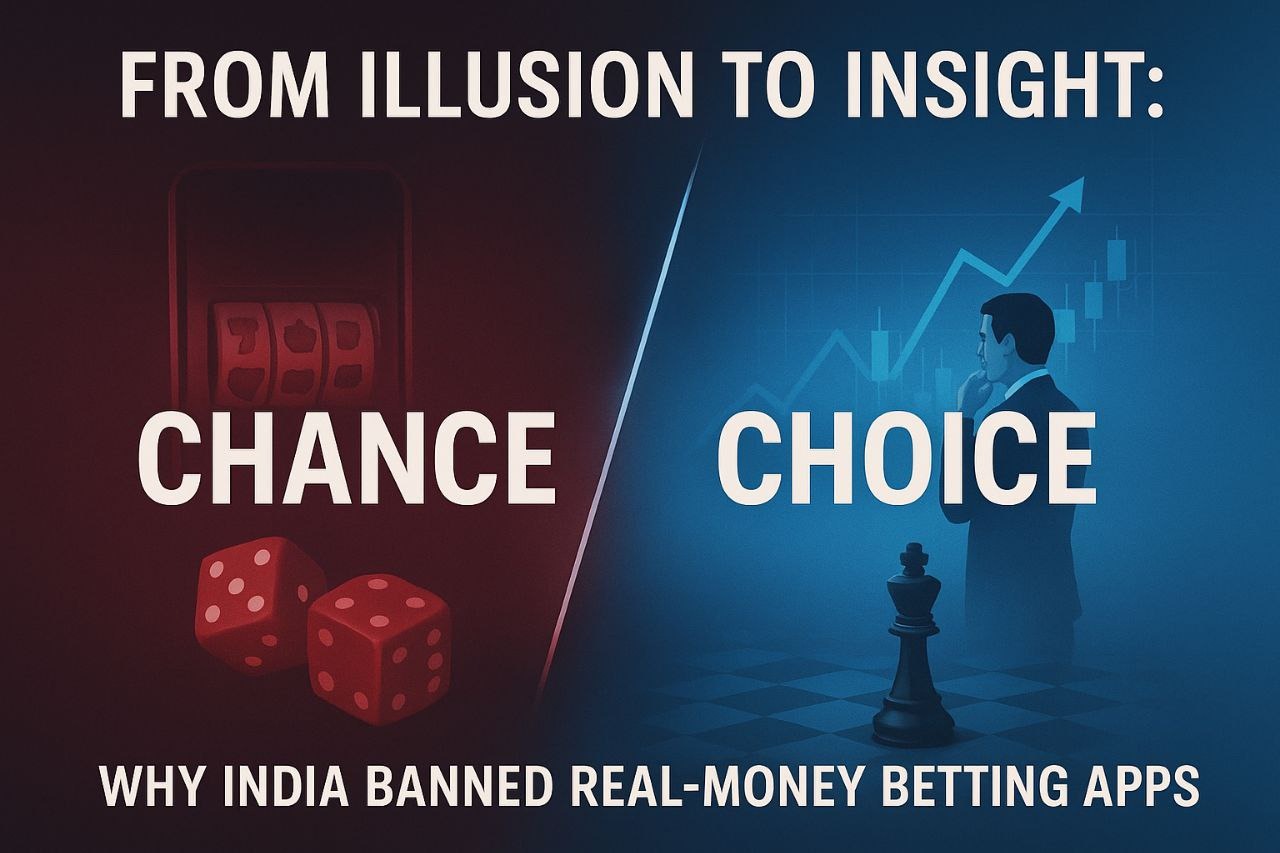The Mirage of Quick Money: Why India Banned Real-Money Betting Apps

In today’s digital age, where visibility often matters more than substance, the herd mentality of many new-age founders is hard to miss. On platforms like LinkedIn, every trending topic sparks a race to appear as a “thought leader.” Yet, scratch beneath the surface and you’ll find shallow commentary, often detached from facts, legal frameworks, or societal implications.
The recent uproar around India’s ban on real-money betting and gaming apps is one such case. Start-up voices rushed in, many echoing each other without studying the government’s detailed reasoning or even reading the Online Gaming Bill, 2025. Some went as far as comparing these predatory apps with stock trading, a comparison as misleading as it is dangerous.
Betting Apps: A Business of Addiction
Real-money betting apps are not entertainment; they are engineered addictions. They thrive on chance, not skill. Their algorithms are designed to hook users into cycles of impulsive play, exploiting psychology to maximize losses while masking them with the illusion of quick wins.
The result? Financial ruin, debt traps, broken families, and, tragically, rising incidents of suicides.
“Betting apps don’t sell games; they sell illusions, until those illusions consume lives.” ~ Adarsh Singh
Stock Trading: From Coin Flip to Chess Game
At a glance, stock trading may appear to share similarities with betting. Prices go up, prices go down, it looks like a coin toss. But unlike gambling, the similarity ends there.
Trading is regulated, skill-based, and transparent. While the untrained retail trader may begin with a probability slightly below 50% due to costs and biases, learning and discipline can shift the odds. Through financial literacy, research, and risk management, probability turns into strategy.
“Trading begins with a coin flip, but evolves into a chess game. Gambling never grows beyond the coin flip.” ~ Adarsh Singh
Equating the two ignores the vital difference between chance and choice.
The Government’s Reasons for the Ban
The Online Gaming Bill, 2025, is not a reactionary step, it is a carefully reasoned intervention. Here are the key grounds cited by the Government of India:
Public Health & Addiction
The government highlighted a surge in cases of addiction, financial collapse, and suicides linked to online betting. Manipulative designs encourage compulsive play, leaving families devastated. Protecting citizens from such predatory harm is a primary justification.
National Security & Financial Crimes
Authorities flagged risks of money laundering, terror financing, and tax evasion through these platforms. Several instances revealed betting apps being misused for illicit fund transfers. The ban acts as a safeguard against such threats to national security.
Consistency with Existing Laws
Offline gambling has long been illegal across Indian states. The ban aligns digital practices with these laws, ensuring regulatory harmony and removing legal ambiguity around online versions of gambling.
Societal Protection, Not Criminalization of Users
Importantly, the law targets operators, promoters, and enablers, not users. Players are seen as victims of predatory platforms. Harsh penalties, including fines and imprisonment, apply to those who run or advertise these illegal businesses.
Welfare Above Revenue
Yes, the government acknowledged the economic trade-off: loss of over ₹20,000 crore in tax revenue and job cuts. But the decision was described as a “calculated sacrifice”, prioritizing social well-being over fiscal gain.
Encouragement of Positive Gaming
The Bill makes clear that e-sports, educational games, and non-stake-based digital engagement remain encouraged. By banning harmful gambling while nurturing skill-based digital ecosystems, the government aims to balance protection with innovation.
“India’s strength lies not in chasing illusions of wealth, but in building pathways of wisdom, skill, and resilience.” ~ Adarsh Singh
Herd Mentality vs Grounded Reasoning
Many founders who casually defended betting apps under the banner of “innovation” ignored these critical points. Their comparisons with stock trading are not just misplaced, they dilute the seriousness of addiction, crime, and exploitation. True leadership would have demanded financial literacy, simplified disclosures, and better safeguards for retail participants. Instead, we saw a scramble for visibility, not accountability.
The Real Divide: Chance vs Choice
At its essence, the debate isn’t about apps or innovation. It’s about the very values we choose as a society.
Betting is chance, engineered to enslave.
Trading is choice, shaped by skill and discipline.
Confusing the two erases the distinction between addiction and aspiration, illusion and growth, chaos and clarity.
The Government of India’s ban is not just justified, it is essential. It represents a stand for dignity, stability, and national security.
“A society that confuses gambling with growth risks losing both. The future belongs to clarity, not chaos.” ~ Adarsh Singh
India doesn’t need another generation seduced by illusions of easy wealth. It needs an ecosystem that values skill, education, and resilience. By banning real-money betting apps, the government has drawn a firm line between exploitation and empowerment.
This is not a ban on freedom. It is a protection of responsibility.
“True progress is not measured by how fast we chase money, but by how wisely we guard our people.” ~ Adarsh Singh
Fri Sep 5, 2025
